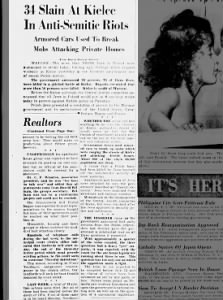- Headline
-
Polish Jews Called To Strike
- Sub-Headline
- 34 Slain At Kielce In Anti-Semitic Riots
- Publication Date
- Friday, July 5, 1946
- Historical Event
-
Kielce Jews Massacred in "Blood Libel" Pogrom
This database includes 1,201 articles about this event - Article Type
- Newspaper
- Page Section and Number
- 2
- Author/Byline
- Beacon Journal Services
- Article Text
- WARSAW—The more than 100,000 .Jews in Poland were summoned to strike today, fanning ugly feelings which erupted violently at Kielce yesterday in the bloodiest anti-Semitic riot of recent Polish history.
The government announced 28 persons, 26 of them Jews, were killed in a pitched battle at Kielce. Reports circulated that more than 50 persons were killed. Kielce is south of Warsaw.
Before the Kielce outbreak, the Central Jewish committee announced that all Jews in Poland would put on a one-hour strike today in protest against British policy in Palestine.
Polish Jews presented a resolution of protest to the Warsaw government and to ambassadors of the United States, Great Britain, Russia and France.
---
WHETHER THE strike call had anything to do with the violence at Kielce, authorities feared it would serve as fuel for the flames of resentment already stirred by the riot at the farm market and industrial center.
Government forces used armored cars to break up mobs which were ranging the streets of Kielce and attacking Jewish homes. About 800 of the city's 60,000 population are Jews.
A rumor that a Polish baby had been killed by Jews touched off the anti-Semitic activity at noon yesterday.
Apartments and homes of Jews were attacked by men the government described as "Fascist elements." Jews were snatched from streetcars and railway coaches.
Mobs struck at the headquarters of the Central Jewish committee of Kielce, but were repulsed after the Jews appealed to security police and militiamen.
---
THE DISORDER came as the government announced that early returns from the Polish referendum last Sunday gave the government a substantial lead on all three questions it presented.
With approximately a quarter of the votes counted, the three questions had a heavy "yes" majority, it was reported, with the count for the one-house legislature running about three to one. This question was the only one on which the opposition made a fight.
The total is not expected to be compiled before July 12 and no claims of victory have been advanced as yet by any party or bloc. Voters were polled on Poland's new western boundaries and upon the government's nationalization acts, as well as on the question of a unicameral legislature. - History Unfolded Contributor
- Amy P.
- Location of Research
- Newspapers.com (https://www.newspapers.com)
Learn More about this Historical Event: Kielce Jews Massacred in "Blood Libel" Pogrom
The Kielce Pogrom: A Blood Libel Massacre of Holocaust Survivors (Encyclopedia Article)
Bibliography
Brass, Paul R., editor. Riots and Pogroms. New York: New York University Press, 1996.
Engel, David, "Patterns of Anti-Jewish Violence in Poland, 1944-1946," Yad Vashem Studies Vol. XXVI, Jerusalem 1998, pp 43-85.
Gross, Jan T. Fear: Anti-Semitism in Poland After Auschwitz: An Essay in Historical Interpretation. New York: Random House, 2006.
Kielce, July 4, 1946: Background, Context and Events. Chicago: The Polish Educational Foundation in North America, 1996.
Klier, John D., and Shlomo Lambroza, editors. Pogroms: Anti-Jewish Violence in Modern Russian History. Cambridge: Cambridge University Press, 1992.
Meducki, Stanislaw. "The Pogrom in Kielce on 4 July 1946." Polin: Studies in Polish Jewry 9 (1996): 158-169.
All articles about this event
